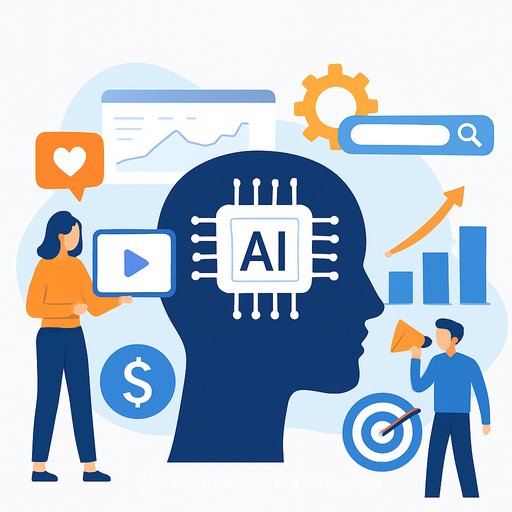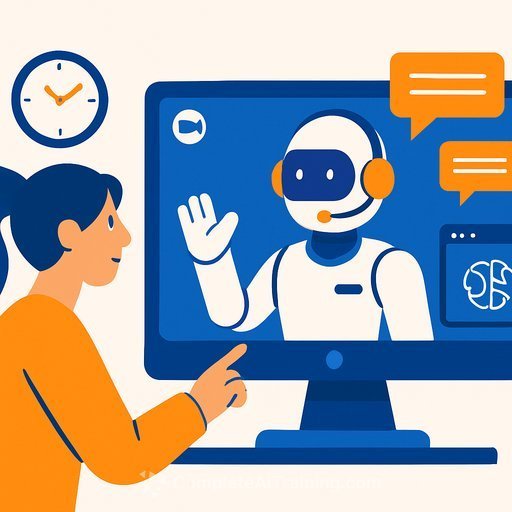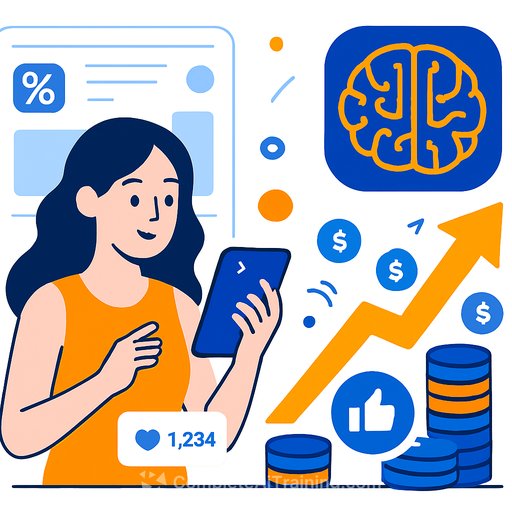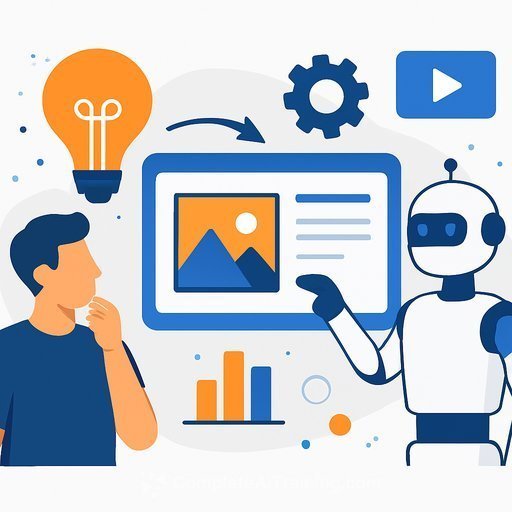Generative AI in Marketing: From Experiments to Everyday Advantage
AI is now the baseline for competitive marketing. Teams using it report faster output, sharper targeting, and better outcomes. According to McKinsey's 2025 Global Survey on AI, organizations using AI for marketing see up to 20% higher revenue growth than non-adopters. That edge compounds with every campaign.
The Rise of AI-Powered Content Creation
Tools like Jasper, Copy.ai, and Writesonic ship publish-ready posts, emails, and ad copy in minutes. Marketers are cutting production time by half, then reinvesting that time into strategy and testing. On the visual side, Adobe Firefly and Midjourney let you produce custom images and video variants that fit the brief and the audience.
Momentum is real. Social Media Examiner's 2025 report shows 68% of marketers use generative AI to streamline content and boost output. This isn't about writing faster-it's about shipping more relevant creative, more often.
Personalization at Scale
Hyper-personalization is the new baseline. Platforms like Google's generative stack give access to models that support personalized shopping experiences, while HubSpot's AI features help segment audiences and predict behavior off historical data. Some teams are seeing up to 30% higher engagement from tailored messages and dynamic ad variants.
Performance marketers are leaning on real-time optimization. Funnel.io's recent guidance shows how AI automates content adjustments and audience selection to improve ROI without constant manual tweaks.
SEO and Search in the AI Era
Search behavior is shifting toward AI overviews and assistants. Techniques like Generative Engine Optimization (GEO) are emerging as brands adapt content for AI-driven answers. Ignore this and WordStream warns you could see up to a 40% drop in organic traffic.
What works now: structured data, expert sources, and clear topical authority. Tools like Surfer SEO with AI integrations help align content to both traditional rankings and AI summaries.
Automation and Workflow Efficiency
Generative AI removes repetitive grunt work. Zapier automations can trigger summaries, drafts, and reports across your stack. Grammarly, Canva Magic Studio, and similar tools speed editing, video creation, and on-brand delivery.
McKinsey notes 45% of companies in their survey use AI agents for marketing automation, freeing teams to focus on creative direction and revenue strategy.
Ethics, Accuracy, and Risk Management
AI can amplify bias, privacy risks, and misinformation if left unchecked. Harvard's guidance is clear: build transparency, audit outputs, and set clear standards for data use and model behavior. Treat this like brand safety-because it is.
Cost savings are meaningful-some brands report 30-50% lower marketing costs-but that efficiency must come with accountability. Instituting human-in-the-loop review and regular bias testing should be non-negotiable.
Simple governance checklist
- Define approved data sources and documented prompts.
- Run fact-check and bias scans on all net-new AI assets.
- Label AI-assisted content where required; store version history.
- Review privacy compliance for every integration and vendor.
Multimodal AI and What's Next
Text, image, and video are converging. Multimodal systems and autonomous agents are moving from pilot to production, helping teams ideate, produce, and iterate faster across channels. Expect tighter integration with ads platforms for asset generation and recommendations.
Platform updates from major vendors point to quicker creative testing, smarter feed recommendations, and near-instant ad variant production. Keep your creative ops flexible-formats and specs will keep shifting.
Case Studies Worth Noting
Retail and CPG are moving fast. Amazon's generative tools help sellers scale product descriptions. WPP's work with major platforms shows how brands can rank inside AI assistants with optimized content. Chatbots and AI-assisted forms inside suites like HubSpot continue to lift lead gen efficiency.
Across categories, the pattern is the same: tighter feedback loops, more experiments per week, and faster time-to-learn.
Investment and Adoption Strategy
Budgets are climbing-some forecasts point to a 25% increase in AI marketing spend this year. Smart teams start small, measure hard, then scale. Pilot one workflow per quarter, tie it to a revenue metric, and document the playbook.
- Pick a high-leverage use case: ad creative, lifecycle emails, or blog refreshes.
- Define success: CTR lift, lead quality, sales velocity, or CAC.
- Stand up the stack: data layer → model access → prompts → QA → reporting.
- Upskill the team; don't gate AI behind one "expert."
Regulation and Market Shifts
Compliance isn't optional. Align with GDPR and regional privacy laws before deploying personalization at scale. Maintain data minimization and clear consent flows across every touchpoint.
Market sentiment is optimistic but cautious. Expect policy updates from platforms and governments, changes to how meta descriptions are generated, and tighter restrictions on data use for ads.
Emerging Tools and Vendor Landscape
New entrants launch weekly: creative copilots, prompt hubs, and agent frameworks. Major platforms like Google and Meta are embedding AI deeper into ad delivery and measurement. E-commerce integrations are getting tighter with in-chat transactions and AI-native product discovery.
Pick vendors that offer exportable data, audit logs, and SOC2/ISO credentials. Avoid lock-in where you can.
Playbook: Your Next 30-60-90 Days
- 30 days: Audit content operations. Add AI for briefs, outlines, and first drafts. Set a QA policy.
- 60 days: Launch dynamic ad variants across two channels. Test AI images on top SKUs. Track lift.
- 90 days: Implement GEO for top 10 pages. Build an AI-assisted lifecycle sequence. Report revenue impact.
The Road Ahead
AI will blend with AR, video, and commerce to make experiences feel personal and immediate. The winners will be the teams that ship, learn, and iterate fast-while protecting brand trust and data.
If you want a structured path to upskill your team, explore focused training and certifications for marketers using AI. Start here: AI Certification for Marketing Specialists or browse courses by job role.
Further Reading
Your membership also unlocks:





